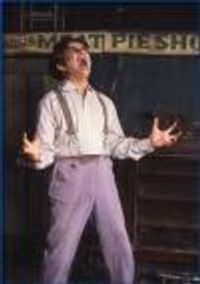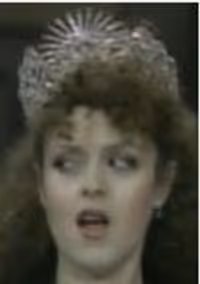Jason Robert Brown on How (Not) to Insult Sondheim
#25Jason Robert Brown on How (Not) to Insult Sondheim
Posted: 11/1/12 at 5:24pm
JRB is a douche. He made it to Broadway because he became good friends with Hal Prince's daughter, and he thought he was worth working with. He has been an egomaniac since the cradle. And I like PARADE.
A stranger, and one named Stephen Sondheim one at that, gives you tickets to his new show and dinner, and you act that way? Come on...
#26Jason Robert Brown on How (Not) to Insult Sondheim
Posted: 11/1/12 at 5:25pmExactly. And the only reason he GOT Parade was because Prince approached Sondheim, and he wasn't interested...
#25Jason Robert Brown on How (Not) to Insult Sondheim
Posted: 11/1/12 at 5:33pmThere is also the fact that JRB was just trying to break through to a career at that point. He has the opportunity to see a show by a man whose work he says made him want to get into musicals, early in its creative stage, with the man himself. So instead, he tries to not say anything about the show? He didn't like it. But aren't there tons of creative questions he could have asked and learned from? Isn't that, like, the ideal opportunity--not to just shrug it off and thinkt o your friend "Well, he's old and I guess has lost it--let's order something expensive from the menu!"
#26Jason Robert Brown on How (Not) to Insult Sondheim
Posted: 11/1/12 at 5:54pm
Also in the early 1990s, Oskar Eustis directed a production of JULIUS CAESAR at the Mark Taper Forum. For reasons I no longer recall, the production was aesthetically controversial and a series of dueling Op-Eds between Tony Kushner and the LA Times' Sylvie Drake ensued.
I saw the production at the end of the week and left a message on Oskar's answering machine that began with "I don't care what anybody says" (meaning Ms. Drake) and going on to talk about how the production had so changed my understanding of the play that I would never see it the same way again. Although the production had its problems, I meant what I said and thought it was the highest possible praise.
Oskar called me back, obviously hurt (though being very much an adult about it), and said, "What kind of message was that? What do you mean? What did who say?!"
I wish I had read Brown's essay at the time. I think his point is that even the most revered theater artist of our era is vulnerable when a new work is revealed to the public and that is no time to try to impress him with your insight and erudition.
And, yes, I like PARADE, but I think Brown is wrong about PASSION.
Thanks to PalJoey for sharing the blog. It's a good reminder, I think.
Updated On: 11/1/12 at 05:54 PM
#27Jason Robert Brown on How (Not) to Insult Sondheim
Posted: 11/1/12 at 6:28pm
It definitely is a sensitive time, and as silly as it sounds, I could easily imagine someone misconstruing those words, Gaveston--but of course that's not what you meant.
OK, this is... odd. In the comments, JRB says this new work he was inited to see by Sondheim was NOT Passion. But he clearly said it WAS Passion before--and I have no idea what other show he could mean by a new Sondheim work? Muscle, which was meant to be paired with Passion, was long out by 1993...
#28Jason Robert Brown on How (Not) to Insult Sondheim
Posted: 11/1/12 at 6:36pmCould be he's just lying.
#29Jason Robert Brown on How (Not) to Insult Sondheim
Posted: 11/1/12 at 6:53pm
And why does Stephen Sondheim--after countless Broadway openings--expect a 23-year-old stranger to know precisely how to behave after a preview (which, if it was PASSION, was almost certainly problematic)?
But I still think there's an important truth at the heart of the story, myth though the tale may be.
#30Jason Robert Brown on How (Not) to Insult Sondheim
Posted: 11/1/12 at 7:03pm
Honestly, Eric, I have an instinctive distrust of vague pleasantries. "I loved it" may be music to Sondheim's ears (and I do remember him saying words to that effect to Prince after the opening of A DOLL'S LIFE), but it's nearly meaningless to me. I'd rather hear about a specific moment or choice that you loved, or even a choice that didn't quite work but could with an adjustment.
But I've learned through experiences such as the one I detail above that other people don't necessarily take my most intense critical scrutiny as the compliment I intend it to be.
(To be entirely fair, I had taken a grad seminar from Oskar and had even written a paper on JULIUS CAESAR. So I was used to discussing the play with him in critical terms, but that was not the time.)
Updated On: 11/1/12 at 07:03 PM
#31Jason Robert Brown on How (Not) to Insult Sondheim
Posted: 11/1/12 at 7:06pmThough Brown's message may be good, the method of delivery is questionable.
#32Jason Robert Brown on How (Not) to Insult Sondheim
Posted: 11/1/12 at 7:09pm
JRB did not "insult" Sondheim, so the blog title is misleading. He was rude, but that's not the same as insulting--in this case anyway.
I don't agree with saying "I loved it" no matter what, but I do agree that "after the show" nothing negative should be said. If I didn't like someone's show/performance, I will usually tell the person "nice job." It's neutral and pleasant and it's not a lie, since as Sondheim himself wrote, nice is different than good.
Updated On: 11/1/12 at 07:09 PM
#33Jason Robert Brown on How (Not) to Insult Sondheim
Posted: 11/1/12 at 7:16pm
But just to play devil's advocate for the moment, isn't that the point of previews? To garner feedback? Is feedback only valuable when it comes from total strangers during a performance?
I realize that few people actually know how to fix a show that is in trouble (and God knows I find post-show audience discussions excrutiating), but why wasn't Sondheim interested in what these two young men actually thought of the show?
Personally, I try to keep in mind that while the actual content of the feedback may be nonsense ("Cut the 11 o'clock number!"), it's often a hint to some problem the speaker just doesn't know the show well enough to identify.
Updated On: 11/1/12 at 07:16 PM
#34Jason Robert Brown on How (Not) to Insult Sondheim
Posted: 11/1/12 at 7:19pmJRB didn't say he provided feedback, exactly though. He decided to say nothing for 20 mins--which must have been unbelievably awkward. When you do provide feedback, it's not very hard to start with positives, or deliver it in a positive manner. There are other issues--I'm not sure Sondheim wanted or needed feedback from JRB, but I do agree simply saying I Love It is the wrong way togo about it.
#35Jason Robert Brown on How (Not) to Insult Sondheim
Posted: 11/1/12 at 7:21pm
Although it is of course debatable and unclear, I agree with Sondheim and others in this thread who have suggested that their role was not to provide criticism. Their role was to be supportive....they are 'fans'.
I kind of draw a parallel to say meeting a celebrity at a stage door or at a signing. No one, no one is going to tell CZJ that she needs to fix her head wobbling, or tell Michael Gore that he ****ed up the CARRIE revival, or tell Bernadette that her voice has aged...it's just not the relationship they have. (Silence is the same function as saying: It's bad).
I've lied to people's faces (acquaintances) and said they were good when I believed they were terrible and should not have dropped out of uni to pursue an acting career. It's just not my place to say otherwise. If they were a close friend, so that I had a 'real' relationship with them maybe, or a relationship that explicitly was defined by criticism (e.g. a critic), I would. But there is a time and a place..
#36Jason Robert Brown on How (Not) to Insult Sondheim
Posted: 11/1/12 at 7:23pm
Eric, don't you think Sondheim could have elicited honest and specific feedback if he had really wanted it? Apparently he did not (and I'm not surprised if the show was PASSION, not because I dislike PASSION, but because I find it the most uncompromising of shows).
But then we're back to asking why have previews at all? So we can fix the unintentional laughter (as Sondheim admits they had to do with PASSION) and have those we know tell us how much they love it?
Updated On: 11/1/12 at 07:23 PM
#37Jason Robert Brown on How (Not) to Insult Sondheim
Posted: 11/1/12 at 7:24pm
You can pretty much tell if someone "loved" a piece by the way they say it. A passionate response followed by details, is probably sincere. The statement alone, should be taken as a courtesy.
And, courtesy is really what this is about, as much as "rudeness". Let's assume the writer is truthful, and his recollections are correct. He and his friend lacked courtesy moreso than exhibited rudeness. Likewise Sondheim, for expecting them to behave a specific way for his ego. You can say Sondheim holds more responsibility as the "host" and the one with the implied power in the little brief relationship. If Sondheim was insulted it's because the young men's doltishness exposed his own egotism. And turned the implied power upside down by putting so much importance in their comments.
#38Jason Robert Brown on How (Not) to Insult Sondheim
Posted: 11/1/12 at 7:30pmThis whole thing reads like a big dysfunctional, disconnected mess. From both sides.
blocked: logan2, Diamonds3, Hamilton22
#39Jason Robert Brown on How (Not) to Insult Sondheim
Posted: 11/1/12 at 7:31pmAs unpleasant as it is, what Sondheim said is absolutely true. It's not right, but it's true.
#40Jason Robert Brown on How (Not) to Insult Sondheim
Posted: 11/1/12 at 7:32pm
I've been on both sides of this kind of situation before. As a creator, you know what went wrong, what needs work, etc. All you really want to know immediately after the performance is that someone else found it worthwhile. Find something nice to say or don't meet up with the creative team afterwards. A general "what'd you think of the show?" moment is not the time to bust out your steno pad and give notes on everything you think is bad.
On the other side, you never know what could set someone on the creative team off. I remember saying nothing but nice things about a well-executed production of Footloose after being invited to the final dress rehearsal. The director thought something was up and asked if I liked the show itself. I told her what I thought of the book (I think it's a flawed adaptation of the film that relies too hard on cinematic memories to cover for a no stakes stage show) and she acted like she herself penned the libretto. I point blank told her it was a great production of that show, but she made up her mind that I hated it, so everyone would hate it. I never said that, but that's what she heard once any negative thoughts came in.
Artists are tricky people. Unless you were invited specifically to give notes after a performance, don't. They will very clearly let you know if they want constructive feedback or not. When they start poking around with "well what did you think of [theatrical element]?," they're fishing for feedback. "Did you like the show?" or "What'd you think?" are not usually invitations to say "it sucks and here's why."
#41Jason Robert Brown on How (Not) to Insult Sondheim
Posted: 11/1/12 at 7:32pm
You are right, playbilly, of course. But I think Brown was not alone at 23 in thinking that Sondheim and Lapine and Prince and the like existed in a rarified world where everyone was discussing Broadway shows with amazing insight and perfect candor at all times.
As I implied above, Sondheim and Prince happened to run into each other where I was sitting at the opening party for A DOLL'S LIFE. I was about 23 and shocked to hear Sondheim praise an obviously bad show with bland generalities. Obviously, I should have learned a lesson that night; instead, I was simply amazed.
(Speaking of that particular show, if only Prince had had ONE friend he trusted to give him an honest opinion, much heartache might have been avoided.)
#42Jason Robert Brown on How (Not) to Insult Sondheim
Posted: 11/1/12 at 7:35pm
"Eric, don't you think Sondheim could have elicited honest and specific feedback if he had really wanted it? Apparently he did not "
At an after show dinner you are treating two young fans to, after "treating" them to the show? I suppose he could have, but why should he have. If he had invited them a week later or something to discuss the show over dinner, that would be different.
#43Jason Robert Brown on How (Not) to Insult Sondheim
Posted: 11/1/12 at 7:37pm
Trentskecth put it perfectly:
"All you really want to know immediately after the performance is that someone else found it worthwhile."
#44Jason Robert Brown on How (Not) to Insult Sondheim
Posted: 11/1/12 at 7:37pm
"As unpleasant as it is, what Sondheim said is absolutely true. It's not right, but it's true."
Trannie, I agree with you, and I also applaud you for putting it so Sondheimianly. Still, I don't fault Brown for not praising Sondheim. It is also true that seeing Passion and feeling that it was not very good - an opinion I share - and not kissing Sondheim's ass is also abolutely true. Perhaps equally not right, but absolutely equally true.
Read more: https://forum.broadwayworld.com/readmessage.php?page=2&thread=1052819#ixzz2B18AhknD
#45Jason Robert Brown on How (Not) to Insult Sondheim
Posted: 11/1/12 at 7:38pm^^^REALLY well put, trentsketch. We should all probably print that out and carry it with us to previews and rehearsals.
#46Jason Robert Brown on How (Not) to Insult Sondheim
Posted: 11/1/12 at 7:41pm
At an after show dinner you are treating two young fans to, after "treating" them to the show? I suppose he could have, but why should he have. If he had invited them a week later or something to discuss the show over dinner, that would be different.
Eric, that sentence was a continuation of my question: what are previews for, if not for feedback?
Someone else said the creators "know what's wrong". Well, apparently not, or they would more often do a better job of fixing it. (I don't mean PASSION; as you know, I think that show was exactly what its creators wanted it to be.)
#47Jason Robert Brown on How (Not) to Insult Sondheim
Posted: 11/1/12 at 7:43pm
"As I implied above, Sondheim and Prince happened to run into each other where I was sitting at the opening party for A DOLL'S LIFE. I was about 23 and shocked to hear Sondheim praise an obviously bad show with bland generalities. Obviously, I should have learned a lesson that night; instead, I was simply amazed.
(Speaking of that particular show, if only Prince had had ONE friend he trusted to give him an honest opinion, much heartache might have been avoided.)"
But these are different things. Sondheim and Prince are peers and friends--maybe Sondheim did make a point to discuss the show with more depth at a better time than *after the show*? No matter, I think the comparison, due to the relationship is not apt, IMHO.
These people DO sometimes invite people (and not just show doctors) to see the show and offer feedback--Michael Bennett did so at Sunday in the Park. Again, that's different as well.
I admit, though, my take on this precise case is coloured by two things, one is that this is a very different way of telling the story than I heard before (and apparently now isn't even about Passion but some mysterious brand new work Sondheim did in 1993), and the other is JRB comes off as extremely, *extremely* arrogant and even rude in a few interviews I've seen of him--I can only imagine how he came off back then. And yes, that's a totally unfair judgement on my part.
Videos









.jpg?format=auto&width=200)
